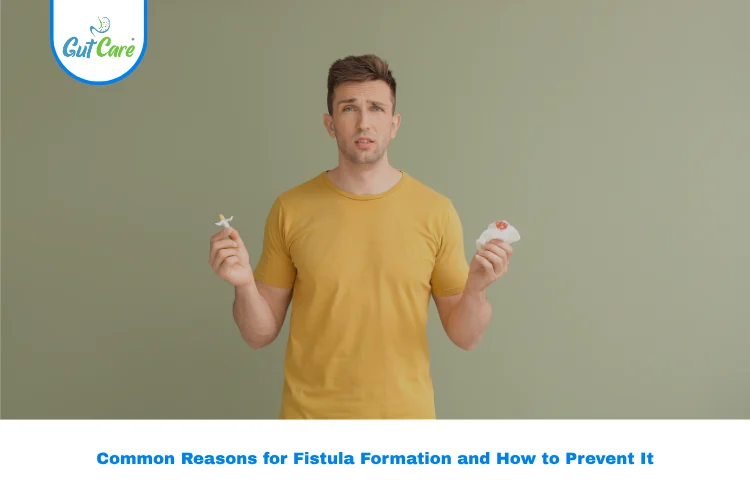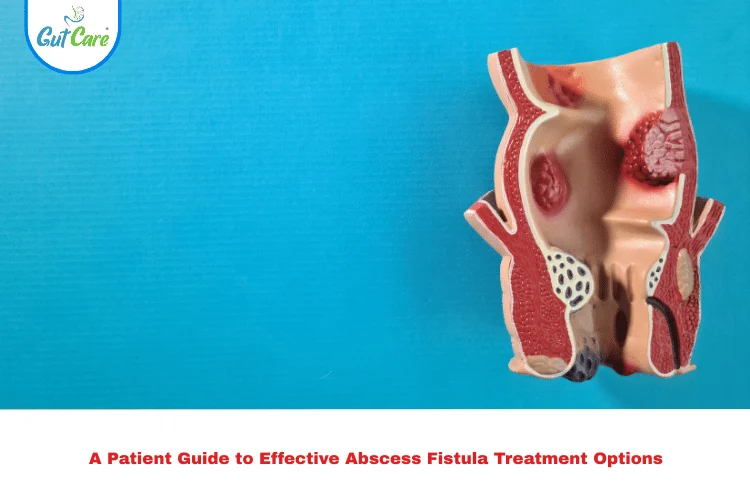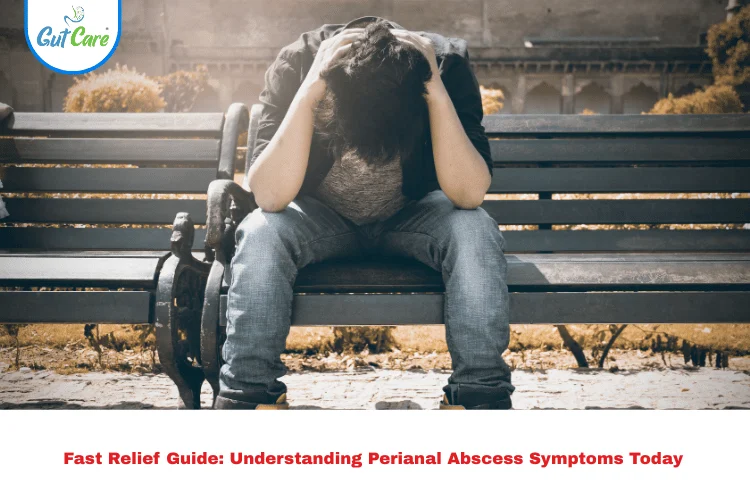The Reasons for Fistula are often linked to infections, abscesses, or prolonged inflammation around the anal region. Understanding these causes can help in early detection and timely treatment. At Gutcare Clinics, Bangalore, Dr. Yuvrajsingh Gehlot, an experienced colorectal surgeon, explains how fistulas develop, their symptoms, and the best ways to prevent them effectively.
What Is Fistula Disease?
Before understanding the Reasons for Fistula, it’s important to know the fistula definition.
A fistula is an abnormal tunnel or connection that forms between two body parts commonly between the anal canal and the skin near the anus. This condition is often the result of a previous infection or abscess that did not heal completely.
In simple words, fistula disease occurs when an internal infection creates a small passage that continues to leak fluid or pus, causing irritation, discomfort, and sometimes pain.
Types of Fistula
Knowing the types of fistula helps in identifying the condition accurately. The Reasons for Fistula may differ based on its type. The most common types include:
- Intersphincteric Fistula:
This is the most common type. The tunnel runs between the internal and external muscles of the anus. - Transsphincteric Fistula:
The tract passes through both muscle layers and may open near the skin. - Suprasphincteric Fistula:
This type extends above the muscles and may cause more pain or swelling. - Extrasphincteric Fistula:
A rare form where the tunnel develops beyond the anal muscles, often linked to deep infections or trauma.
Each type requires proper diagnosis by an expert colorectal surgeon for accurate fistula treatment.
Common Reasons for Fistula Formation
There are several Reasons for Fistula, and understanding them can help you recognize the early signs and avoid complications.
1. Anal Abscess
An anal abscess is one of the main fistula causes. It occurs when a gland inside the anus becomes infected and filled with pus. If not drained properly, the abscess may burst internally, creating a tunnel that forms a fistula.
2. Chronic Infection
Ongoing or untreated infections in the anal area can lead to tissue damage, which may cause a fistula to form over time.
3. Inflammatory Bowel Disease (IBD)
Conditions such as Crohn’s disease can increase inflammation in the intestines and surrounding tissues. This inflammation can be one of the significant Reasons for Fistula formation.
4. Surgery or Injury
Sometimes, previous surgery or trauma to the anal region can result in scar tissue or infections, which later become a cause of fistula development.
5. Tuberculosis or Other Infections
Certain infections, such as tuberculosis or sexually transmitted infections, can also be fistula causes, especially if they affect the rectal or anal tissues.
6. Postpartum or Post-Surgical Complications
Women who experience severe tearing during childbirth or those who have undergone rectal surgery may develop a fistula as a result of tissue injury or infection.
Fistula Symptoms You Shouldn’t Ignore
Recognizing fistula symptoms early helps in timely medical care. The most common signs include:
- Constant or recurring pain near the anus
- Swelling or redness around the anal area
- Discharge of pus or fluid
- Itching or irritation
- Fever or fatigue (in severe cases)
- Difficulty sitting comfortably
If these fistula symptoms persist, it’s important to visit a colorectal surgeon for proper evaluation.
Fistula Treatment Options
At Gutcare Clinics, Bangalore, Dr. Yuvrajsingh Gehlot provides specialized fistula treatment using advanced and minimally invasive methods.
Common treatment options include:
- Fistulotomy:
A traditional surgical method where the tract is opened and cleaned to promote natural healing. - Laser Fistula Treatment:
A modern, minimally invasive technique using laser energy to close the tunnel. It ensures faster recovery and minimal pain. - LIFT Procedure (Ligation of Intersphincteric Fistula Tract):
This technique closes the internal opening of the fistula and is suitable for complex cases. - Seton Placement:
A medical thread is inserted into the fistula to allow gradual healing while preventing infection.
The best approach depends on the type of fistula, its depth, and the patient’s overall health condition.
How to Prevent Fistula Formation
While not all Reasons for Fistula are preventable, certain steps can help reduce your risk:
- Maintain good hygiene around the anal area.
- Treat infections early to avoid abscess formation.
- Eat a fiber-rich diet to prevent constipation and reduce strain during bowel movements.
- Drink plenty of water to aid digestion and healing.
- Avoid prolonged sitting, especially on hard surfaces.
- Consult a colorectal surgeon promptly if you notice pain or swelling.
At Gutcare Clinics, early diagnosis and treatment by Dr. Yuvrajsingh Gehlot can help prevent fistula from becoming chronic.
Why Consult a Specialist?
Even though home care can ease mild discomfort, it’s vital to see an experienced colorectal surgeon for accurate diagnosis and long-term recovery.
Ignoring fistula symptoms can lead to persistent infections or complications that may require more complex treatment later.
Visiting experts like Dr. Yuvrajsingh Gehlot at Gutcare Clinics, Bangalore, ensures proper evaluation, modern treatment, and faster healing.
Conclusion
Understanding the Reasons for Fistula and taking preventive measures can significantly lower your risk. Early detection, good hygiene, and prompt medical consultation are the keys to recovery.
At Gutcare Clinics, patients receive compassionate, advanced care tailored to their needs. If you notice any signs of fistula disease, consult Dr. Yuvrajsingh Gehlot, a leading colorectal surgeon, for accurate diagnosis and effective treatment.
FAQs on Reasons for Fistula
1. What are the main Reasons for Fistula formation?
The main Reasons for Fistula include anal abscesses, infections, inflammatory bowel disease, and previous anal surgeries.
2. What is fistula disease in simple terms?
Fistula disease is an abnormal tunnel between the anus and the surrounding skin, often caused by infection or inflammation.
3. What are the common fistula symptoms to watch for?
Typical fistula symptoms include pain, swelling, pus discharge, and discomfort around the anal area.
4. How is fistula treatment done at Gutcare Clinics?
At Gutcare Clinics, Bangalore, Dr. Yuvrajsingh Gehlot offers advanced fistula treatment options such as laser therapy, fistulotomy, and minimally invasive procedures.
5. Can a fistula heal on its own without treatment?
Usually not. Since the underlying infection remains, medical or surgical fistula treatment by a colorectal surgeon is necessary for complete healing.




